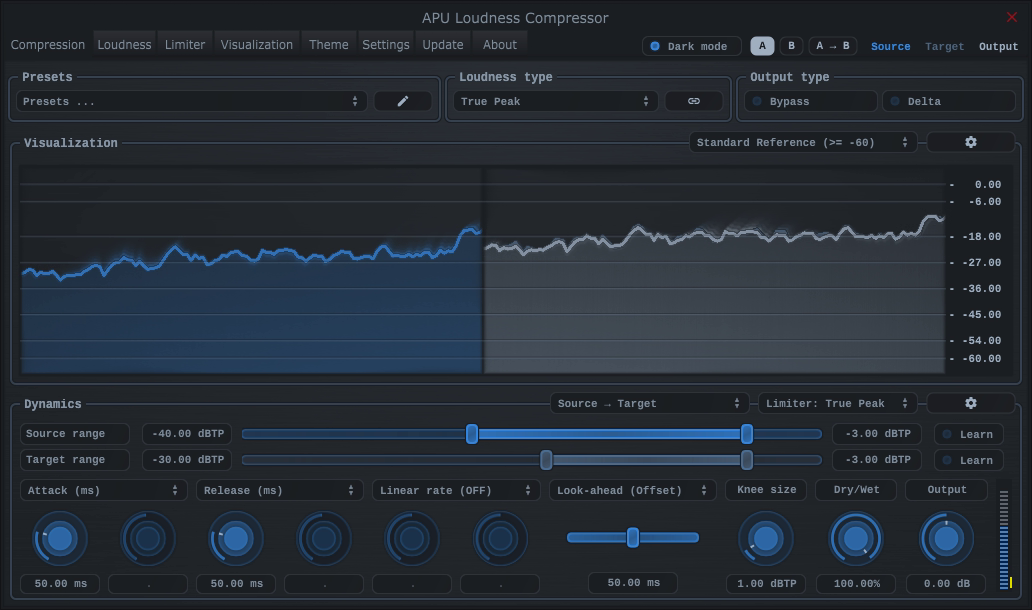APU Loudness Limiter is a real-time limiter designed to support multiple loudness types simultaneously. The limiter can be configured to use LUFS, True Peak, RMS and/or Peak loudness types. This allows it to satisfy multiple requirements at the same time, such as setting a specific LUFS and a specific True Peak. The internal ballistics of the limiter are adjusted to take into account different limiter settings by volume type.
Loudness Flavors
One of the key features of this limiter is its support for various loudness types. The limiter’s detection circuit can be configured to use LUFS and/or traditional units of measurement (RMS, Peak). You can also choose to split or merge channels, which is especially useful for multi-channel audio formats such as Dolby Atmos®.
The limiter’s detection circuit can be configured to use any of the following loudness types:
Momentary
Short-term LUFS measurement (400 ms), which is useful for processing the dynamics of sound at each moment in time. This mode is responsive, yet transparent. K-weighting and channel weighting are applied to the compressor detection circuit, improving perceptual accuracy.
Short-Term
LUFS measurement with a longer duration (3 seconds), which is useful for processing large-scale sound dynamics. Given the longer duration, this mode is less responsive than Instantaneous, but it can be useful for adjusting the overall picture of sound dynamics. K-weighting and channel weighting are applied in the same way as in Instantaneous mode.
Integrated
An infinite duration LUFS meter. K-weighting and channel weighting are applied in the same way as with Instantaneous, as well as both relative and absolute gating. This loudness type can be useful for continuously bringing the integrated loudness of an audio signal toward a specific target.
RMS
Loudness types use a sliding time window of 150 ms by default, which can be adjusted. RMS is a traditional loudness meter that is a good first-order approximation of perceived loudness. This mode does not apply K-weighting or channel weighting to the limiter detection circuit, giving it a more traditional character.
True Peak
True Peak loudness types are similar to traditional peak metering, but are more accurate because they take intersample peaks into account. These metering uses a time window equal to the configured block size (default 1 ms). This mode prevents intersample peaks from being clipped, which can be useful in mastering.
Peak
The peak volume types are a standard peaking scheme, operating on a time interval equal to the configured block size (default 1ms). This is another traditional limiter-style measurement. Technically, this mode is even slightly more responsive than True Peak, but it is less accurate because it does not take into account intersample peaks.
Install the plugin.
Run the keygen and generate the serial number.
Open the plugin, select the About tab and enter the serial number at the bottom – click Activate.
Pre-generated keys for MAC users who don’t know how to run the keygen
5 generated keys, use only 1 for registration (Make sure there are no spaces before and after)
d053316d-57c8-a21b-e556-921d-f643-3e4bb8f1cedcf5626567
08e7da7d-25ac-93ba-f6f5-e979-f445-9668135f3e1ebc44206f
e8ca90ee-8cfb-0f9b-b9c4-9ff1-3b2c-666fabb0015f2f425fa5
99f27e2e-dc3a-320b-0ef1-082f-9219-ef8c380a1dae0793fc8e
51c63d5b-c7da-632b-34eb-5349-de07-7a8366c19a1f7f2d9a08

